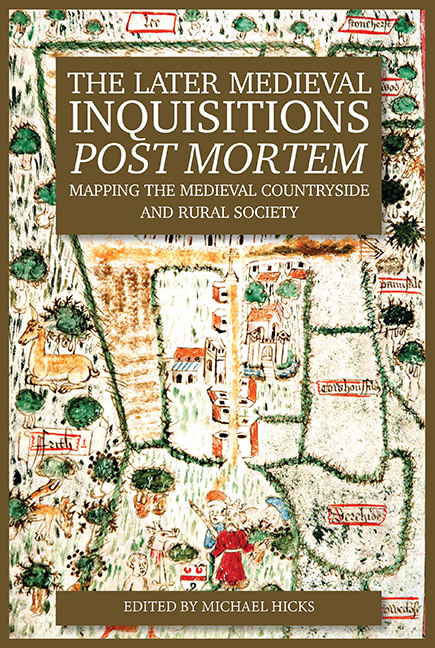Book contents
- Frontmatter
- Contents
- List of Illustrations
- List of Contributors
- Glossary
- List of Abbreviations
- 1 Introduction
- 2 Records of an Imperial Administration? Inquisitions Post Mortem in Scotland and Calais
- 3 Inquisitions Post Mortem in Medieval Ireland
- 4 The Court of the Honour of Clare, 1308–60: Feudal Incidents and Inquisitions
- 5 Landscape, Farming and Society in an English Region: The Inquisitions Post Mortem for the West Midlands, 1250–1509
- 6 Beyond the Dots: Mapping Meaning in the Later Medieval Landscape
- 7 Fairs and Markets in the Inquisitions Post Mortem
- 8 The Structure of the Milling Industry 1427–37
- 9 Proofs of Age 1246 to 1430: Their Nature, Veracity and Use as Sources
- 10 What Went On in the Medieval Parish Church, 1377–1447, with Particular Reference to Churching
- 11 Retainers, Monks and Wine: Three Insights into Everyday Life
- 12 The Administration and Efficiency of the Inquisitions Post Mortem Process: A Case Study of Northumberland
- 13 Late Medieval Land Disputes and the Manipulation of the Inquisitions Post Mortem
- Index
3 - Inquisitions Post Mortem in Medieval Ireland
Published online by Cambridge University Press: 26 May 2021
- Frontmatter
- Contents
- List of Illustrations
- List of Contributors
- Glossary
- List of Abbreviations
- 1 Introduction
- 2 Records of an Imperial Administration? Inquisitions Post Mortem in Scotland and Calais
- 3 Inquisitions Post Mortem in Medieval Ireland
- 4 The Court of the Honour of Clare, 1308–60: Feudal Incidents and Inquisitions
- 5 Landscape, Farming and Society in an English Region: The Inquisitions Post Mortem for the West Midlands, 1250–1509
- 6 Beyond the Dots: Mapping Meaning in the Later Medieval Landscape
- 7 Fairs and Markets in the Inquisitions Post Mortem
- 8 The Structure of the Milling Industry 1427–37
- 9 Proofs of Age 1246 to 1430: Their Nature, Veracity and Use as Sources
- 10 What Went On in the Medieval Parish Church, 1377–1447, with Particular Reference to Churching
- 11 Retainers, Monks and Wine: Three Insights into Everyday Life
- 12 The Administration and Efficiency of the Inquisitions Post Mortem Process: A Case Study of Northumberland
- 13 Late Medieval Land Disputes and the Manipulation of the Inquisitions Post Mortem
- Index
Summary
In his preface to the companion to The Fifteenth-Century Inquisitions Post Mortem, Michael Hicks highlights the achievements of the medieval IPMs project, arguing that ‘It sets the agenda for the much fuller exploitation of a key source for many aspects of the late medieval English economy and society and sets out the rewards of more sustained study of the IPMs.’ As Gordon McKelvie demonstrates above, it is not just the history of medieval England which can be illuminated by improved access to and investigation of IPMs. The present paper surveys those inquisitions relating to medieval Ireland filed in the English chancery between the reigns of Henry III and Henry V. It analyses the management of the IPM process between Westminster and Dublin, compares the roles of the Irish escheator and his English counterparts, examines the composition of IPM juries and assesses the significance of Irish lands to the feudal rights of the English crown during the Middle Ages. Although Irish IPMs are few in number, they supplement the broader governmental and seigneurial record and provide key data and penetrating insights into land and landed society in Ireland over two centuries. They are a valuable counterpoint to recent studies of the inquisition process in England.
The Sources and Their Publication
Inquisitions post mortem were legal enquiries held to answer specific questions concerning the rights of the crown to land and other feudal incidents following the death of tenants-in-chief. They were conducted in or near the locality concerned before officers of the crown, who took evidence from local witnesses to clarify the points at issue. Between 1240 and 1415, at least 178 IPM extents and associated writs and memoranda were returned to the English chancery from Ireland. These documents now survive in the main chancery IPM series (C 132–138) at The National Archives and relate to 79 individuals with possessions across Ireland. Calendared in English in 2007 alongside a similar number of Irish inquisitions in the chancery ad quod damnum (C 143) and Miscellaneous (C 145) series, they are now accessible with full extents and complete lists and an index of jurors. In devising and compiling Inquisitions and Extents of Medieval Ireland, Brendan Smith and the present author aimed to create a fuller source-base in print for historians of the medieval Irish economy and society, and thereby to ‘provoke new questions and encourage re-examination of familiar topics’.
- Type
- Chapter
- Information
- The Later Medieval Inquisitions Post MortemMapping the Medieval Countryside and Rural Society, pp. 24 - 48Publisher: Boydell & BrewerPrint publication year: 2016



